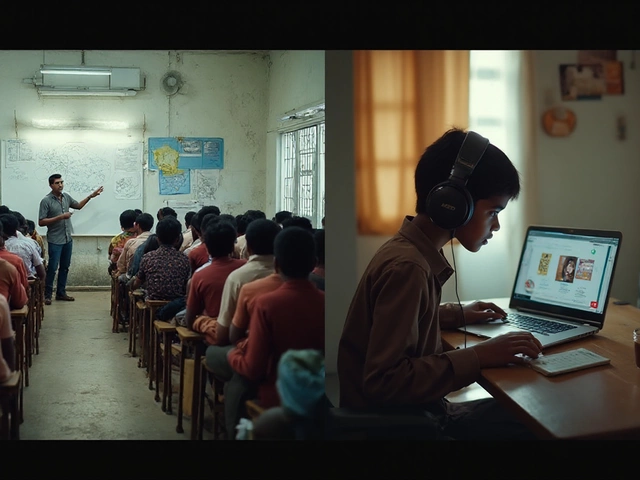
When it comes to choosing a degree, the notion of difficulty is as varied as the courses themselves. Some degrees have reputations that precede them, synonymous with late nights, endless textbooks, and relentless exams. Competitive exams add another dimension to this struggle, often determining entry into prestigious programs or esteemed professions.
Understanding which degree might stand as the 'hardest' isn't purely objective—it intertwines with personal aptitudes, industry demands, and the specific institution. Whether it's the precision required in medicine, the critical thinking needed in law, or the high-level problem-solving in engineering, each has its own formidable climb.
- Understanding Academic Rigors
- The Role of Competitive Exams
- Challenging Fields of Study
- Tips for Surviving Tough Degrees
Understanding Academic Rigors
In the realm of academia, the rigors of education often craft a path that is as challenging as it is rewarding. When we talk about difficult degrees, we're essentially delving into the intricate web of coursework, the depth of study expected, and the relentless pace at which students are required to learn and apply knowledge. Degrees in fields such as medicine, engineering, and law are notorious for their demanding nature. They require not just intellectual aptitude but also resilience and adaptability. Each curriculum is designed not just to educate but to test the limits of perseverance and mental endurance. For instance, the grueling years in medical school combine not only the theoretical study of complex subjects like human anatomy and pharmacology but also the practical, high-pressure environment of clinical rotations. This dual demand, theory meeting practice, is what sets such degrees apart.
Many students find their journey through these challenging courses peppered with sleepless nights and a constant pressure to excel in competitive environments. The workload can be immense, often leaving little room for rest, social activities, or even the luxury of procrastination. Take engineering, for example. The breadth of subjects ranging from thermodynamics to computer science principles means students need to quickly pivot from abstract mathematical concepts to hands-on projects. This diversity is much more than just academic content—it's about learning to think in multiple dimensions and anticipating real-world problems before they arise.
"The secret to success in suffering through tough courses is not just about intelligence or talent—it's about discipline," notes Dr. David Simons, a renowned professor of engineering at MIT.The truth of this statement resonates deeply with anyone who has been through the ordeal of a demanding academic course. The path is fraught with intense study sessions and critical exams, especially for those pursuing degrees in law where understanding the nuances of legal precedents is crucial. Here, the academic rigor is not just about absorbing knowledge but learning to dissect information and apply it judiciously in theoretical and practical exams.
Achieving Balance
Many students often wonder how to strike a balance amidst these rigorous curriculums. The answer lies in smart prioritization and effective time management. It's crucial to understand your learning style and adapt the study schedule accordingly. Some students thrive with morning study sessions while others perform best late at night; knowing oneself simplifies the daunting process of tackling enormous reading material and multiple project deadlines. Furthermore, staying organized with to-do lists or digital planners can help manage the load efficiently, breaking down large tasks into achievable segments. Success often depends less on the charismatic appeal of natural proficiency and more on meticulous planning and strategic execution.
Additionally, understanding the structure of one's degree program is vital. This means familiarizing yourself not only with the curriculum but also understanding the expectations set by professors. Regular consultations, discussions, and feedback can significantly ease the process of navigating through tough academic terrains. Adapting to these demands while maintaining one's well-being can indeed seem like walking a tightrope. However, with adequate support systems such as study groups, mentorship, and student counseling services, achieving academic goals becomes an attainable milestone. The real challenge isn't just academic—it’s about developing a mindset that can withstand both pressure and constant learning.

The Role of Competitive Exams
Competitive exams are the gatekeepers for some of the most sought-after degrees, acting as a metric of a student's readiness and potential for a particular field. These exams aren't just a test of knowledge, but also an ordeal that assesses a myriad of skills, including time management, stress handling, and strategic thinking. In countries like India, the IIT-JEE for engineering and NEET for medicine are infamous for their low acceptance rates, with a dismal percentage of students making the cut each year. The selectiveness of these exams adds a layer of prestige to the courses they unlock, amplifying their perceived difficulty and desirability.
Understandably, competitive exams require months, sometimes years, of dedicated preparation. The syllabus can stretch over a broad array of subjects, demanding an in-depth understanding rather than rote learning. Students often start preparing early, with some beginning even during their secondary education. It becomes a lifestyle commitment, overshadowing other activities and shaping their daily routines. Success in these exams often hinges as much on mental endurance as on intellectual prowess. Some of these exams are multiple-choice, designed to test accuracy and speed, leaving no room for error. A small fraction can significantly alter potential exam results, echoing the intense competitiveness of these fields.
From the famous SAT in the United States for college admissions to the bar exam for lawyers, these tests create a pressure-cooker environment, testing not just technical knowledge but emotional stability and persistence. As Henry David Thoreau once put it, pretty much if "go confidently in the direction of your dreams, live the life you have imagined." Competitive exams demand this confidence and resilience from aspiring professionals. Many believe that the rigorous nature of these assessments also prepares students for the pressures they will face in their professional careers, acting as a microcosm of challenges ahead.

Challenging Fields of Study
Tackling some of the most difficult fields of study can feel like climbing a steep and unending mountain. Among these, medicine often ranks prominently. This field demands not just an aptitude for the biological sciences, but also an unswerving commitment to years of rigorous education and practice. Medical students face a relentless schedule that includes practical rotations, detailed anatomy lectures, and numerous exams. What's more, each stage of education, from undergraduate to medical school, is punctuated by fiercely competitive exams like the MCAT and USMLE.
Engineering is another daunting academic journey, known for its complexity and breadth. Students in this field immerse themselves in subjects such as mathematics, physics, and programming, all requiring an exceptional level of problem-solving skills. Engineering programs often include intricate projects and laboratories, pushing students to apply theoretical concepts practically. These students must also tackle challenging qualifying exams that assess their competencies before they can proceed to professional practice.
"The beautiful thing about learning is that nobody can take it away from you." - B.B. King
The realm of law is equally demanding, where aspirants must master an extensive body of rules and precedents. Law students are expected to hone their analytical thinking and develop persuasive arguments, often dissecting complex case laws and legal principles. The bar exams are infamously difficult, designed to test the breadth and depth of a candidate's legal understanding and their capacity to apply it under pressure. The journey through law school and these exams is nothing short of a marathon, requiring no less than absolute dedication.
The multifaceted field of architecture also offers its own set of challenges, often combining artistic flair with mathematical precision. Students must manage courses that simultaneously require knowledge of art history, structural engineering, and modern design software. They are tasked with producing original designs that meet aesthetic and practical concerns. Architecture students may endure sleepless nights crafting their portfolios, preparing for critiques that mirror real-world demands. Competitive exams and architecture license requirements, such as the ARE, add another rigorous layer for those pursuing this field.
These difficult degrees, accompanied by their respective competitive exams, often push students beyond their limits. However, they also offer unparalleled opportunities for personal and professional growth. For those willing to embrace the challenge, these fields promise rewarding and dynamic careers that can truly make a difference in the world.

Tips for Surviving Tough Degrees
Surviving a challenging degree can feel like navigating a labyrinth of complex material, tight deadlines, and high-stakes exams. It’s essential to recognize the importance of having a strategic approach to manage this academic journey. One critical factor is developing a well-organized study schedule. Allocating specific times each day dedicated to studying helps maintain consistency and prevents last-minute cramming. This practice not only reinforces learning but also reduces stress associated with looming deadlines. Utilizing tools like planners or digital calendars to keep track of assignments, exams, and personal commitments can greatly enhance time management abilities.
Equally significant is the need to actively participate in study groups. Connecting with peers provides a support system where sharing knowledge, discussing difficult topics, and tackling problem-solving scenarios becomes more manageable. The exchange of diverse perspectives often leads to a deeper understanding of challenging concepts. Moreover, professors and tutors become invaluable resources; building a rapport with them can lead to insightful clarifications and personalized assistance, especially useful in unforgiving subjects like engineering or medicine. Remember, the quickest way to grasp a difficult topic is to teach it to someone else, as explained by Einstein, "If you can't explain it simply, you don't understand it well enough."
Another key element is prioritizing mental and physical health, which often gets neglected amidst rigorous academic pressures. Regular exercise has proven benefits in boosting brain function and reducing anxiety. Even short breaks involving physical activity can re-energize the mind, increasing focus and efficiency. Balanced nutrition plays a role as well, providing the necessary fuel for academic exertion. Similarly, ensuring adequate sleep is paramount; it aids memory retention and consolidates learning. This holistic approach of maintaining physical health significantly embodies success strategies as essential as academic diligence itself.
Furthermore, leveraging technology can streamline the study process. Numerous apps offer easy access to educational resources, flashcards, and even productivity boosters. Online platforms provide an extensive repository of lectures and tutorials that cater to all learning styles, making revisiting lecture material straightforward and convenient. Embracing these digital aids complements traditional learning yet is crucial for keeping up with technological advancements in competitive fields. Bringing these elements together fosters an environment where the seemingly endless challenges of tough degrees become manageable.
Lastly, maintaining a balanced perspective towards failure and feedback is paramount. Failure is often an unwilling companion on the road to success, particularly in fields fraught with competitive exams. It’s key to view setbacks as learning opportunities rather than as barriers. Constructive criticism should serve as a guide for improvement. Resilience in academic pathways is built through accepting and using feedback to fuel growth. Every improvement counts, much like striding confidently one step at a time until the summit of academic achievement is reached.





